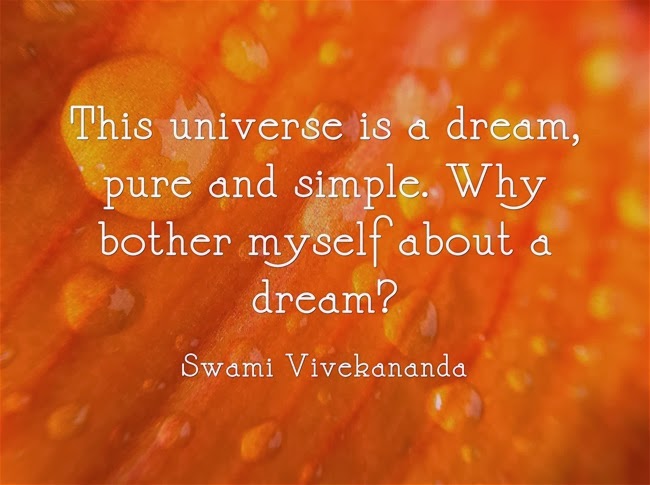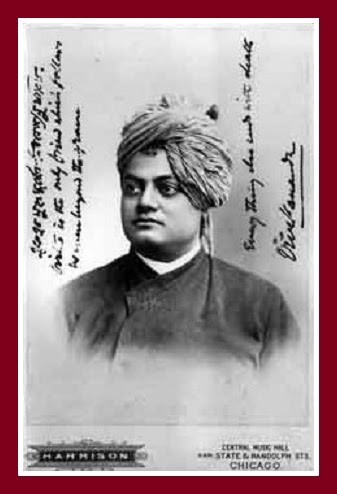Swami Vivekananda once told— "I am indebted to my mother for the efflorescence of my knowledge.". We know
Bhuvaneswari Devi's religious temperament highly influenced Narendranath in his childhood. In this article we are going to make a collection of
Swami Vivekananda's quotes and comments on or related to his mother
Bhuvaneswari Devi.
In letters
[All are arranged in chronological order]
4 July 1889
 |
If there is any being I love
in the whole world, it is my mother.
—Swami Vivekananda
Image source: Wikimedia Commons |
At this time Swami Vivekananda was travelling all over India as a wandering monk—
[Source]
And particularly, I see no chance of success while remaining near Calcutta. In Calcutta live my mother and two brothers. I am the eldest; the second is preparing for the First Arts Examination, and the third is young.
15 February 1893
- Two months ago, I dreamt that my mother was dead and I was very anxious to know about her.[Source]
29 January 1894, letter written to Haridas Viharidas Desai
If there is any being I love in the whole world, it is my mother.
[Source]
22 November 1898, letter written to Ajit Singh of Khetri
In this letter Vivekananda requested Ajit Singh's financial help to buidl a house for his mother—
[Source]
I have one great sin rankling always in my breast, and that is [in order] to do a service to the world, I have sadly neglected my mother. Again, since my second brother has gone away, she has become awfully worn-out with grief. Now my last desire is to make Sevâ [give service] and serve my mother, for some years at least. I want to live with my mother and get my younger brother married to prevent extinction of the family. This will certainly smoothen my last days as well as those of my mother. She lives now in a hovel. I want to build a little, decent home for her and make some provision for the youngest, as there is very little hope of his being a good earning man. Is it too much for a royal descendent of Ramchandra to do for one he loves and calls his friend? I do not know whom else to appeal to. The money I got from Europe was for the "work", and every penny almost has been given over to that work. Nor can I beg of others for help for my own self. About my own family affairs — I have exposed myself to your Highness, and none else shall know of it. I am tired, heartsick and dying. Do, I pray, this last great work of kindness to me, befitting your great and generous nature and [as] a crest to the numerous kindnesses you have shown me. And as your Highness will make my last days smooth and easy, may He whom I have tried to serve all my life ever shower His choicest blessings on you and yours.
6 August 1899, letter written to Mrs Ole Bull
The aunt whom you saw had a deep-laid plan to cheat me, and she and her people contrived to sell me a house for 6,000 Rs., or £400, and I bought [it] for my mother in good faith. Then they would not give me possession, hoping that I would not go to court for the shame of taking forcible possession as a Sannyasin.. . . Sevier gave me 8,000 Rs. with the express desire of helping my mother. This money, it seems, has [also] gone to the dogs.[Source]
27 December 1899, letter written to Mrs. Ole Bull
Mr. Leggett has got a little over £500 I had with Sturdy on account of Raja-Yoga and the Maharaja of Khetri. I have now about a thousand dollars with Mr. Leggett. If I die, kindly send that money to my mother. I wired to the boys three weeks ago that I was perfectly cured. If I don't get any worse, this much health as I have now will do well enough. Do not worry at all on my account; I am up and working with a will.
[Source]
17 January 1900, letter written to Mrs. Ole Bull
- It is becoming clearer to me that I lay down all the concerns of the Math and for a time go back to my mother. She has suffered much through me. I must try to smooth her last days. Do you know, this was just exactly what the great Shankarâchârya himself had to do! He had to go back to his mother in the last few days of her life! I accept it, I am resigned.[Source]
- Leaving my mother was a great renunciation in 1884 — it is a greater renunciation to go back to my mother now. Probably Mother wants me to undergo the same that She made the great Âchârya undergo in old days. Is it?[Source]
7 March 1900, letter written to Mrs. Ole Bull
As for my mother, I am going back to her — for my last days and hers. The thousand dollars I have in New York will bring Rs. 9 a month; then I bought for her a bit of land which will bring about Rs. 6; and her old house — that will bring, say, Rs. 6. I leave the house under litigation out of consideration, as I have not got it. Myself, my mother, my grandmother, and my brother will live on Rs. 20 a month easy. I would start just now, if I could make money for a passage to India, without touching the 1,000 dollars in New York.
[Source]
18 May 1900, letter written to Mrs. Ole Bull
I have got some in Calcutta and some with the Leggetts, and if you give a thousand more, that will be a fund for my own personal expenses (as you know I never took Math money) as well as for my mother. Kindly write to Saradananda to give up the little house plan. I am not going to write any more for weeks yet — till I completely recover. I hope to get over [it] in a few weeks from now — it was a terrible relapse. I am with a Doctor friend [Dr. Milburn H. Logan], and he is taking every care of me.[Source]
4 March 1902, letter written to Sister Nivedita
Note: This letter was written just 3 months before Vivekananda's death
I have spent the little money I brought from Europe in feeding my mother and paying her debts. What little remains I cannot touch, as that is the expense for the pending lawsuit.[Source]
In other works
Religion, Civilisation, And Miracles (The Appeal-Avalanche)
From a news article of 1894—
[Source]
I was born, in Bengal and become a monk and a celibate from choice. At my birth my father had a horoscope taken of my life, but would never tell me what it was. Some years ago when I visited my home, my father having died, I came across the chart among some papers in my mother's possession and saw from it that I was destined to become a wanderer on the face of the earth.
Ideals of Womanhood
From a lecture delivered at Brooklyn Standard Union, 21 January 1895—
[Source]
'Keep yourself holy, and pure.' So deeply has this been recognized in India, that there we even speak of adultery in marriage, except when marriage is consummated in prayer. And I and every good Hindoo believe, that my mother was pure and holy, and hence I owe her everything that I am. That is the secret of the race — chastity
This page was last updated on: 28 January 2014, 1:45 pm IST (UTC+5:30 hours)
Number of revisions in this page: 1






























